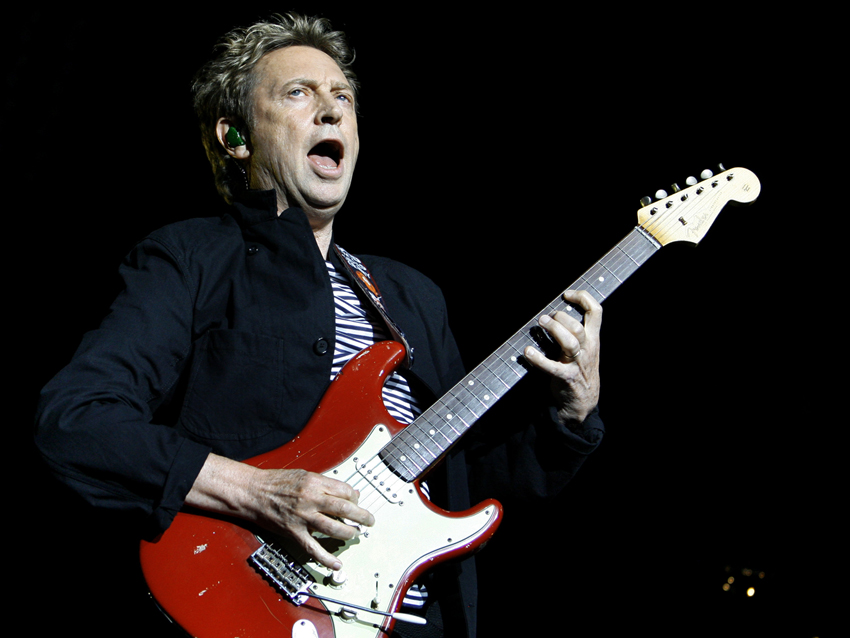
Andy Summers talks guitars, effects, The Police and his new band, Circa Zero
Halfway into the song Say Goodnight – just one of 13 hook-filled and immensely satisfying tracks from Circa Zero's debut album, Circus Hero – former Police guitarist Andy Summers hits a couple of echoey chords that wouldn't sound out of place on classic discs like Outlandos d'Amour or Regatta de Blanc.
Summers admits that the Roxanne-ish sound is "a little bit Policey," but he also claims that if anybody has the right to such a sonic style, it's him. “Yeah, I own that one,” he says with a laugh.
Over the years, scores of guitarists, including a few well-known players, have lifted bits from Summers' signature sound, a shimmering blend of creative chord voicings and effects treatments. And don't think that he hasn't noticed: "What we did in The Police definitely entered the lexicon, if you like," Summers says. "It’s there as part of the fabric. It’s a very nice thing to have, a legacy, I suppose. I take it as a compliment.”
At an age (71) when most well-heeled rock legends would either be rounding the globe on a reunion tour (he's done that already) or retiring to their private island, Summers is apparently hungry for more action. Last year, he formed Circa Zero with multi-instrumentalist and singer Rob Giles (from The Rescues). After a small handful of LA gigs last year, the two cut Circus Hero at Summers' Bowl Of Cherries studio in Venice, California. For millions of fans hankering to hear the guitar icon applying his skills once again to smart, driving melodic pop-rock, the album is a made-to-order winner.
Summers spoke to MusicRadar by phone about Circus Hero, why The Police never made another album, his status as a guitar "anti-hero," the axes and effects he's currently using, and his thoughts on another six-string sonic pioneer, The Edge. (Circa Zero's Circus Hero can be purchased at the following links: Amazon, iTunes, Walmart and Amazon.)
Last year, you said that this record is what you "thought the Police should have done, but didn’t." Which begs the question: Well, why didn’t you?
“Yeah, I know. That was a very provocative line for me to put out there, sort of upsetting for some people, I suppose. [Laughs] And it reflects on me good or bad – hmm, let me think… Within that, you know, we were a very political, difficult band, although obviously there was a musical chemistry. I was probably thinking in some ways that we’d been a bit more ‘rock’ that we were. You know, we’re a rock band, so we should hit it harder.
“With this record, working with Rob, some of those constraints went away. Our chemistry is very much there; we get on really well. We don’t seem to have the difficulties that I experienced in The Police about wrestling something to the ground. We get to things faster. I think the message to ourselves was, ‘Let’s make a rock record.’ And when we said ‘rock,’ we didn’t mean an alternative record or an indie soft record. We were gonna play like a rock band, very guitar driven. That was the mission.”
Within The Police, was the prevailing notion about making another record something like, “Well, we made five flat-out classics. Why mess with that?”
“There always is that thought, sure. You know, and there’s the eternal question: ‘When are you guys going back on the road?’ It’s like, listen, we just had one of the greatest tours of all time. It was the absolute golden moment since 2000 hit us. What’ll we do, a tour that is not as good and is a lot smaller? That wouldn’t look so good, would it? I suppose if you were a greedy person, you’d say, “Oh, yeah, let’s go out and do it again – make some more money!’
“But you know, you have a sense of self. We know who we are – we think we’re pretty classy people. We don’t want to smirch or smear that golden thing we just left behind. There is some thinking to that. For The Police to go out again, it’d be difficult. It’d be such a sell-out and so political to make another record. And it’s like, ‘You know what? We just did incredibly well. Let’s leave it there.’ Making this record was so fresh and exciting, so that’s the move for me.”
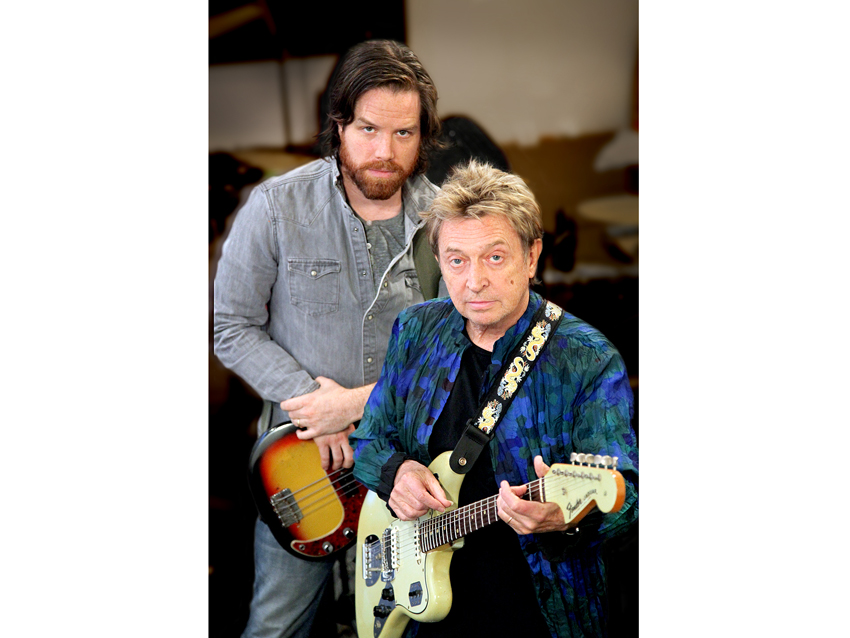
Working with Rob Giles (pictured left)
I imagine that you’ve had a lot of people asking you to work with them over the years – ‘Hey, let’s form a band.’ What was it about Rob that appealed to you?
“That’s a good question. Yeah, I do get a lot of offers. Maybe I’m too much of a snob, but I just don’t think it’s going to be me, or I don’t think they’re quite up to it. The real golden chemistries are hard to find. Maybe I had it with Sting – obviously, the world embraced what was going on there. The other part of it, sort of post-Police, of course, is that I’ve been in virtually the greatest rock band of all time. We had incredible success worldwide. What are you gonna do? Go into another rock band right away and take it to the third division? It doesn’t really make a lot of sense.
“So I went away from that and went into another kind of music – it was completely logical to me. Part of that was my own never-ending musical curiosity and, like all of us, wanting to play better and better and getting more complex, just wanting to do other things. I was never a simple pop-playing guy; that was never the deal for me.
“Post-Police, I was actually writing a lot of songs. I was putting together a rock album, sort of musing about, and the culmination of that was meeting Rob. He came over to the studio and sang one of the songs I’d written, and of course, he completely blew me away with his great singing.
“That afternoon, we sat around with a couple of guitars and kind of got into it. We didn’t really know each other, but I knew very quickly that this guy had it all: a great singer, wonderful writing ability, and he also happened to be a very good drummer. After a couple of hours, he said, ‘Hey, man, let’s do it. Let’s make a rock record.’ And then he started coming to the studio, and off we went.”
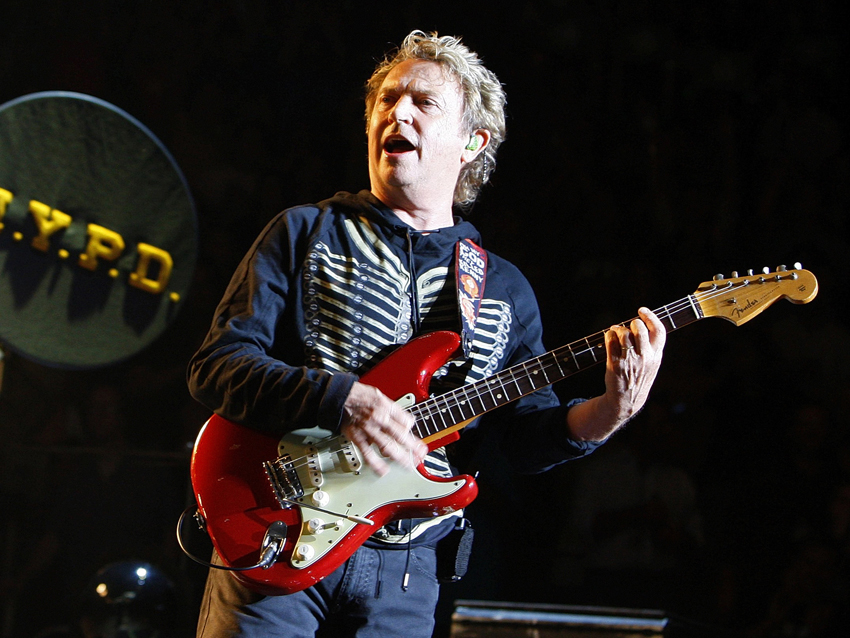
Is he a metalhead?
As you said, you have made a lot of different kinds of records – some of them were experimental and avant-garde. The idea of doing full-on, hooky rock music never left you, though.
“Well, you know, there’s good and bad in everything. There’s crappy rock and there’s great rock. Genres don’t really matter so much. You might have predilections toward one type of music than the other, whether it’s jazz or classical, country music or rock, whatever you like. Obviously, I’ve had great experiences in the pop-rock field – I’ve done it for years – so it’s not like I forgot how to do it. [Laughs]
“There’s a part of me that’s always enjoyed rock. To some extent, I actually enjoy metal bands. It’s thrilling if it’s a great one. I think a band like King’s X is incredible. They’re one of the greatest and not sufficiently recognized bands. So, in a way, doing this – ‘Let’s make a rock record’ – it was fun. We didn’t have to go into jazz or do anything experimental. It was like, ‘If we’re gonna make a rock record, we need to write some songs – great structures, great hooks, and they need to really kick.’ That in itself is hard enough. To write 12 or 13 really good songs that really work is not easy. Most people can’t do it. But to me, the really good thing about this album is, there’s not a weak track on it.”
With you and Rob working on the album together, how exactly were the tunes built up?
“Well, see, I tend to work alone or with a technician who operates Pro Tools. What I do is, I start writing at home, basically with a one-track digital recorder. I get a lot of ideas, and then I come to my studio with the best of them, and I start fleshing them out into Pro Tools and taking them further. The guy who works with me, we’ve worked together for years, so there’s absolutely no constraints. It’s intimate: I sit on the couch and play with the pedals, play the guitar – I can sit there for 10 minutes trying to think of the next note. It’s fine, ‘cause there’s no time constraints.
“With Rob, it was sort of an expansion of that. He’d come down, and maybe I’d have a lick; for instance, one of the things I had was Light The Fuse And Run. I said, ‘I’ve got this thing. I think it could be something.’ He got right on the drums. Right next to my Pro Tools setup, I have a Roland electronic drum kit. So he’d either pick up and bass and we’d get into it, or he’d get on the drums and we’d see if that stimulates into the next thing. We’d build something up like that.
“Usually, between me playing the guitar – lines, riffs, whatever – and Rob playing the drums, and then he would add bass – and then he’d probably think about singing on it, unless we already had the melodic line carved out – and that was the general process. From there, we’d go back to them, hearing them fresh, and modifying them until we got what we’ve got.”
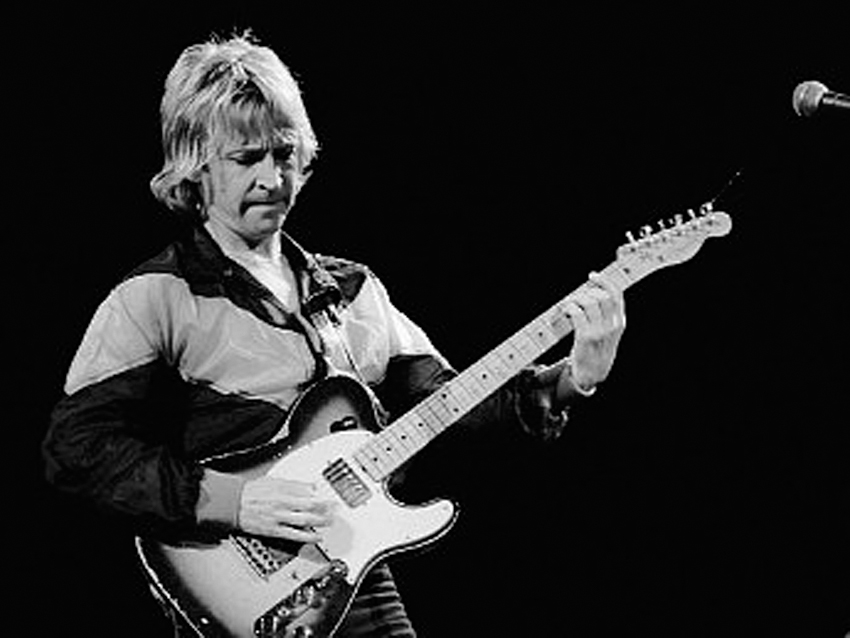
Eschewing long solos in The Police
From a guitar standpoint, trying to pick a “best” solo on the record is impossible. Underground, Gamma Ray, Night Time, Shoot Out – they’re all fantastic. You played some memorable solos in The Police, but they were very tight.
“Tight, yeah. Well, we came out of a certain era. If you cast your mind back to late ‘70s London, guitar solos were not only absolutely not de rigueur; they were thrown out the window. The punks associated that with people like Eric Clapton and Jeff Beck, and they just didn’t want any part of that. Our band was spawned in the middle of that craziness, and it sort of stayed with us.
“I did play more live, but it wasn’t the feature that I would have hoped it would be. I felt like I was a complete virtuoso before I met Sting and Stewart, but it was more restrained. That was the prevailing style at that particular juncture. With this record, of course, it’s different. Now my attitude is, ‘Unless I’m gonna play loads of guitar, I’m not in the band.’” [Laughs]
Well, you’re definitely stretching out here.
“Yeah. Yeah, it was a lot of fun for me.”
Your overall use of guitar sounds on the record reminds me of the Andy Summers who started pioneering guitar effects at the start of The Police. You still enjoy sonic experimentation.
“Clearly, I’ve always had an ear for the sonic stuff. There are people who have gone way out into the outer fringes, much farther than I ever have. Right now, I think we’re in a golden age of it. The guitar pedal universe is quite amazing. I hate to say that I’m a pedal junkie, but boy, I’ve sure gotten into it more than I used to. I own a lot of pedals and new stuff. Outside of Circa Zero, I’m putting together a ballet with a visual artist in New York, and I’m preparing all the music. It’s very sonic, not songs but more sonic landscapes. It’s lots of loops and pedal effects, building these gigantic sounds. We’ve got all of these incredible pedals to work with – they didn’t used to exist.”
As we were saying, your guitar playing in The Police did influence a lot of players, but in a very peculiar way. You were more of a guitar “anti-hero.”
“In a way, yeah. That was coming out of the whole punk thing, like we did. Of course, we expanded out from that in a long way by the end. That was the beginning of it, the idea that there weren’t endless guitar solos, sprawling heavy metal, indulgent. It wasn’t that; it was much more about the songs and the tightness.
“But it was more than that. It was trying to create a really original sound with a three piece, ‘cause I don’t think we sounded like any other three piece. It was partly that restraint and partly the use of the Echoplex, which I used a lot; it really opened the sound. And it was Sting’s use of a sort of reggae bass line in a lot of songs, and of course, there’s Stewart’s very unique drumming style. We certainly didn’t sound like the Cream, and we didn’t sound like the Jimi Hendrix Experience. We had our own unique sound, which was equally strong and valid. I think that’s why it’s been so long lasting.”
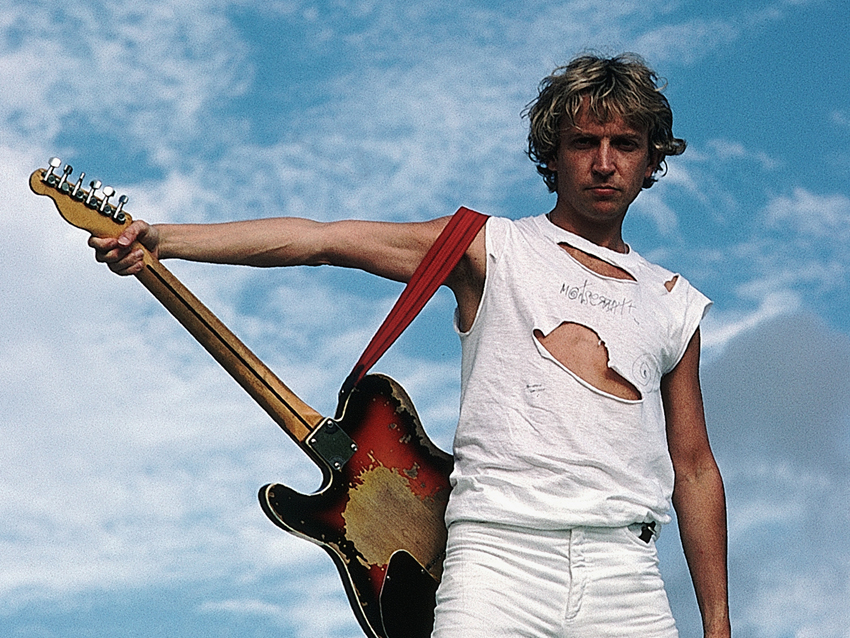
On The Edge
Someone who came along two years after you and who also pioneered guitar sounds – it wasn’t about solos; it was about sound – was The Edge. What did you think about what he was doing?
“People mention it from time to time, and you know, I don’t like to get like, ‘Oh, he ripped me off.’ We’re a similar era, and Edge is obviously known for using a lot of echo. He’s a nice guy; he’s a very sweet man. You have to hand it to him: For the skills that he has, he’s made a very identifiable guitar sound. You know, they’re probably virtually the most successful band of all time, maybe.”
They’re right up there. I ask because in the ‘60s you had Clapton and Beck, and then in the late ‘70s, we had you and The Edge doing a whole different thing.
“Very different, yeah. But that’s the scene that I come from, and I just think that I’m one of those guys. To me, I belong in that small pantheon of British guitarists. There’s only five or six of us. I definitely think that’s where I am. I started out with Eric and Jeff.”
Let’s talk about your main guitars these days. Are you still using the ’61 Telecaster?
“I have it. It’s in the studio all the time. I’m not using it so much. The few guitars I did this record with were a Stratocaster, which is one that Fender made for me; it’s kind of a replica of my 1961 red Strat. They made two Strats for me to do The Police tour. They’re both killer guitars, so I’ve got those in the studio. Basically, I used one of those two Strats and a Custom Shop Les Paul. Most of the record was done with those two guitars.”
I figured that you might have 200 guitars – it gets to be too many options.
“Kind of, yeah. I’m staring at two huge racks of them right now. And that’s just one room – the other room’s got the same. It’s a bit much.”
The ’61 Tele – you bought that off of one of your guitar students back in the day.
“Yeah, at the time I was scraping by teaching people how to play. Some guy offered if to me for 200 bucks. That’s it, you know?”
For you, that ended up being the deal of the century.
“Yeah, I know. I played the guitar and I thought it was fantastic. I asked the guy, ‘Are you really sure you want to sell it?’ And he was like, ‘No, no, I don’t want it. You can have it.’ And so I got it for 200 bucks. I could probably sell it for a million dollars now. It was just meant to be.”
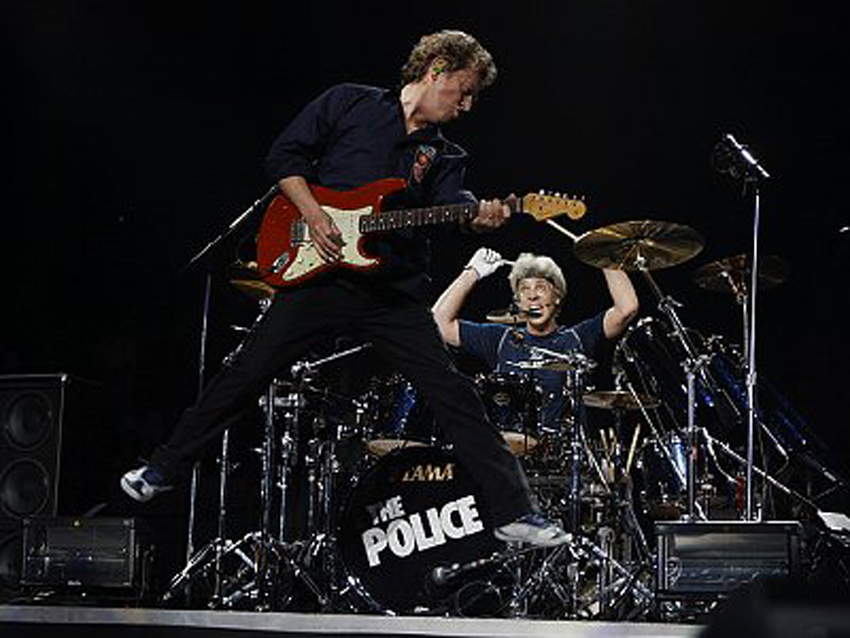
On his 1961 Telecaster
When you played it for the first time, did you think, “There’s music inside this guitar. I can do something with this”?
“Yeah. It just completely suited me. The way it had been already changed – somebody had a Gibson humbucker on the front, and they put this overdrive into it, its out-of-phase switch – it just completely worked for me. It’s an amazing guitar, kind of a life-changer.”
What kinds of pedals and effects are you using now? Anything new that you’ve fallen in love with?
“Yeah, I… I should get my book. One thing I will say, having so much equipment available, I’ve had to sort of organize. It’s not like I’m in a room with a bunch of pedals lying on the floor. I’ve actually got all my guitars catalogued; they’re all in a book. If I forget one, we look in the book and it’s like, ‘Oh, there it is. Well, where is that? Oh, it’s upstairs. It’s number 47. Let’s go and get it.’ [Laughs] We’ve got it organized.
“Finally, with my pedals, we’re fairly up to date with them in the book. ‘These are fuzz, these are distortion, these are chorus, these are echo.’ I made little notes about what they all do. To some extent, it’s like a painter with an incredible, never-ending box of colors. You kind of have to have some way of being on top of it, so we finally notated it all.
“Currently, one of my favorite new ones is the Eventide Harmonizer H9 pedal – fantastic. I mean, quite special, very sonic. I’m using that quite a lot. There’s a new one from TC Electronic called Dark Matter, which I really like. Very good. I don’t know what you’d call it – fuzz or distortion – but it’s tremendous. I just got something called a Rotobone by a guy named Paul Trombetta. I haven’t tried it out yet, but we’ve had conversations on the phone.
“I’m using things like [Z.vex] Lo-Fi Junky, Lo-Fi Looper; I’ve got Electro-Harmonix 16 Second Delays… Christ, it goes on forever. One move I did recently which has really helped me was, ‘cause in my studio I sit on the couch and the Pro Tools is in front of me. So instead of standing over my pedalboard and squinting down, trying to remember what everything is, I made this little table that’s right about knee-high, and I’m sort of leaning over it. So I can really clearly see with my eyes and my head much closer to the pedals.
“I know this sounds weird. I’ve got everything right in front of me, and I can switch pedals around and hit buttons. It’s made a huge difference. I know it sounds really eccentric, but you know, I’m in an intimate, creative moment, and I want to be right on top of these things that are making the sounds. They’re literally right under my hand. That’s how I’m doing it now. Of course, I couldn’t do that live.”
I was going to ask about that.
“Yeah, well, the glorious thing about live, if I can get back to it if we can ever afford to do it in this band, is to have somebody else operating the pedals.”
Joe is a freelance journalist who has, over the past few decades, interviewed hundreds of guitarists for Guitar World, Guitar Player, MusicRadar and Classic Rock. He is also a former editor of Guitar World, contributing writer for Guitar Aficionado and VP of A&R for Island Records. He’s an enthusiastic guitarist, but he’s nowhere near the likes of the people he interviews. Surprisingly, his skills are more suited to the drums. If you need a drummer for your Beatles tribute band, look him up.
